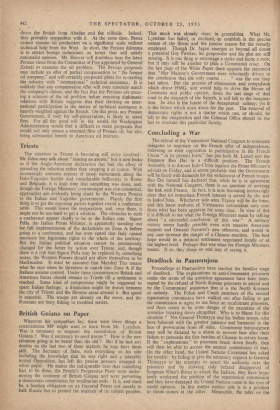Trieste
The situation in Trieste is becoming still more involved : Mr. Eden may talk about " lancing an abcess," but it now looks as if the Anglo-American declaration has had the effect of spreading the infection rather than stopping it at source. With increasingly ominous reports of troop movements along the Italo-Yugoslav border and considerable bellicosity in Rome and Belgrade, it is high time that something was done, and, though the Foreign Ministers' communiqué was non-committal, approaches are evidently being made by the Western Powers to the Italian and Yugoslav governments. Plainly the first thing is to get the opposing parties together round a conference table. This would lower the temperature, and, once there, it might not be too hard to get a solution. The obstacles to such a conference appear chiefly to be on the Italian side. Signor Pella, the Italian Prime Minister, is apparently standing out for full implementation of the declaration on Zone A before going to a conference, and has even stated that Italy cannot renounce her legitimate rights to the whole of the territory. But the Italian political situation cannot be permanently changed for the better by action over Trieste, and, though there is a risk that Signor Pella may be replaced by something worse, the Western Powers should not allow themselves to be blackmailed. It must be assumed that Marshal Tito means what he says when he threatens to march into Zone A if the Italians assume control. Under these circumstances British and American forces should remain in Trieste till a settlement is reached. Some kind of compromise might be suggested to spare Italian feelings: a distinction might be drawn between the city of Trieste and the Slovene areas around it. But speed is essential. The troops are already on the move, and the Russians are busy fishing in troubled waters.


































 Previous page
Previous page